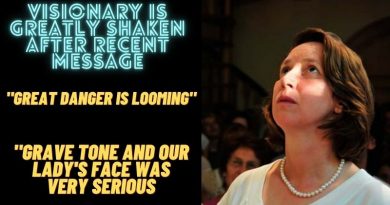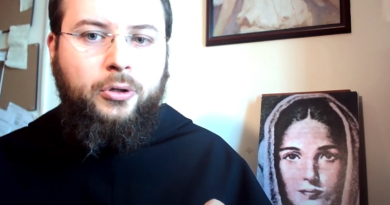Pope Francis Speaks about the Devil in surprising detail
Lorena Bianchetti: Your Holiness, first of all, thank you for being here. I am here on behalf of all the people who, at this time, are experiencing complex states of soul: bewilderment, anguish, fear, suffering. I’ll begin with a time: three, three in the afternoon. Jesus dies on the cross, and dies an innocent man. There are many people who do not want war, but who are suffering from it. These days, there are images of lifeless bodies on the street, there is even talk of mobile crematoria, and even of rape, devastation, barbarity.
What is happening to humanity, Your Holiness?
Holy Father: But this is not new. One writer said that “Jesus Christ is in agony until the end of the world”. He is in agony in his children, in his brothers and sisters, above all in the poor, in the marginalized, in the poor people who cannot defend themselves. At this moment in Europe, this war is really affecting us. But let’s look a little further. The world is at war, the world is at war! Syria, Yemen, then think of the Rohingya people driven out, without a homeland. War is everywhere. The genocide in Rwanda 25 years ago. Because the world has chosen – it’s hard to say this – but the world has chosen the path of Cain and war is enacting what Cain did, that is, killing one’s brother.
Lorena Bianchetti: And this is so because good exists and evil exists. You have often warned us about the way in which evil acts. You have told us that the devil presents himself in a good light, he flatters us. but in reality, evil wants only our defeat: do not dialogue with the devil. And so, I ask you, precisely in light of what you have said, how can forms of mediation be found, forms of dialogue with the person, or at any rate, with those persons, who want and who pursue only the imposition of power?
Holy Father: When I say not to dialogue with the devil, it is because the devil is evil, lacking anything good! We say he’s like absolute evil. He is the one who rebelled totally against God! But with those people who are sick, who have this disease of hatred, you speak, you dialogue, and Jesus conversed with many sinners, even with Judas up to the end as “friend”, always with tenderness because all of us always have, with the Lord’s spirit, something good that He embedded within us. And when I am in front of a person and I always – we all say this, we all say it differently – when we are in front of a person, we have to think about what to this person: to the evil part or to the hidden, more good, part. All of us want something good, everyone! This is truly the image of God in us. But we must never give up on a person, no…who’s ended up doing evil, and say, “This person is condemned”. A woman comes to my mind who went to confession to the Cure of Ars because her husband had thrown himself off a bridge. The Cure listened to her, crying. “What I am most upset about is that he is in hell”. “Stop”, he told her. “Between the bridge and the river is the mercy of God”. God always tries to save us even to the end, because he embedded something good in us. He placed it in Cain as well, Abel and Cain, but Cain did a violent deed; and war is carried out with this deed.
Lorena Bianchetti: But, what do you think, even from a cultural point of view, is there enough of a commitment – I am talking even about the ecclesial level, so not only cultural – is there enough of a commitment toward cautioning those people who are tempted to fall and to live with hell in their hearts already on this earth? I am saying this to you because at times we live in a society in which it seems the diabolic is decisively more attractive, more stimulating than what is good, honest, kind, even spiritual, which appears and is presenting as being boring.
Holy Father: Yes, this is true. Evil is more seductive. Going back to the devil, someone says that I speak too much about the devil. But he is real. I believe in him, eh! Some say: “No, he is a myth”. I don’t go along with myths, I go along with reality, I believe it. But he is seductive. Seduction always tries to enter promising something. If sins were ugly, if they didn’t contain anything good, no one would sin. The devil presents something beautiful about the sin to you, and leads you to sin. For example, those who create war, those who destroy the lives of others, those who exploit people for work. The other day I heard a family recounting that their father, still a young married man, had to work as an agricultural day labourer, who would leave early in the morning, and return in the evening, making very little, exploited by a company worth billions. This too is war. This too is destroying, it’s not only tanks, this is destruction too. The devil is always after our destruction. Why? Because we are the image of God. Let’s go back to the beginning, three in the afternoon. Jesus dies, dies alone. The most absolute solitude, abandoned even by God: “Why have you abandoned me?” The most absolute solitude, because he wanted to descend even into the worst depths of our solitude to pull us out of it. He returns to the Father, but first he descends, he is in every exploited person, those who suffer war, those who suffer destruction, those who suffer trafficking. How many women are slaves of trafficking here in Rome and in the large cities. It is a work of evil. It is war.
Lorena Bianchetti: In short, as Dostoevsky said in Brothers Karamazov: “God and devil are fighting there, and the battlefield is the heart of man”. That’s where the game’s played.
Holy Father: That’s where it’s played. This is why meekness is needed, that humility to say to God: “I am a sinner, but you save me, help me!” Because each one of us has within the possibility of doing what others are doing who are destroying people, who exploit people. For sin is possible due to our weakness and also due to our pride.
Lorena Bianchetti: Earlier you recalled the phrase Jesus said on the cross: “My God, why have you abandoned me?” And this phrase betrays solitude, but also distress, anguish, and so, even desperation, the state of soul that all of us experience when we do not know what the solution to a suffering is, but even a sense of guilt. Regarding desperation, what comes to my mind, Your Holiness, is an image from this war – and I say it as a mother – a father running with his child in his arms because he had been hit by shrapnel. He and his wife are running to the hospital, desperate. The news that was reported is that this child, unfortunately, did not make it. I cannot imagine a desperation more heartbreaking than that of those two parents who lose a child in this way. What do you feel like saying to them? What do you want to say to those parents who live this heartbreaking experience?
Holy Father: You know, you learn in life. I have had to learn many things, and I still have to learn because I hope to live a little longer, but I need to learn. And one of the things I have learned is not to speak when someone is suffering. Whether a sick person, or a tragedy. I take them by the hand, in silence. But when they come to you [to say], and you are sick, “No, but she here or there, but the Lord…”. Keep quite! Keep quiet! In the presence of suffering: silence. And weeping. It is true that weeping is a gift of God, it is a gift we need to ask for: the grace to weep, before our weaknesses, before the weaknesses and tragedies of the world. But there are no words. You cited Dostoevsky. What comes to me [my mind] is that little booklet that is like a summary of all of his philosophy, his theology, everything: Notes from Underground. And in there it says that someone was dying, a person died – they were convicts, prisoners who were in hospital – someone died there and they would pick them up and take them away. And someone else from another bed, says: “Please, stop! Even he had a mother”. The image of the woman, the image of the mother before the cross. This is a message, it is a message from Jesus for us, it is the message of the tenderness in a mother. In the worst moment of his life, Jesus did not insult.
Lorena Bianchetti: Since you have brought up women, Your Holiness, there were indeed women under the cross. There is another image I would like to bring up. Let’s go back again to Ukraine. A pregnant woman, being transported on a stretcher because she was wounded in the war, transported in the midst of the rubble, while trying to caress her womb with the last ounce of strength she has left. From what was reported, not even this woman with child made it. Truly, the women, the strength of women, comes to my mind. Russian mothers come to my mind, Ukrainian mothers come to my mind. And so, regarding the role of women, I ask you: how important is the active role of women around the negotiating table, to construct peace concretely?
Holy Father: There is an expression, “Women are capable of giving life even to a dead person”. Women are at the crossroads of the greatest fatalities, they are there, they are strong. This is interesting. Jesus is the bridegroom of the Church, and the Church is a woman. This is why mother Church is so strong. I am not referring to clericalism, to the Church’s sins. No. Mother Church means the one who, at the foot of the cross, sustains us sinners. One thing that touches me a lot, and makes me think of Mary and the other women at the foot of the cross. Sometimes I had to go to some parish in an area in Buenos Aires called Villa Devoto. I would take the bus, the 86. It would pass in front of a prison, and many times I would go by and there was a line of the prisoners’ mothers there. They let their faces be seen for their children, because everyone who passed by would say: “These are the mothers of the ones inside”. And they tolerated the most shameful security checks, all to see their child. The strength of a woman, of a mother, that is capable of accompanying their children even to the end. And this is Mary and the women at the foot of the cross. And to accompany a child, knowing that many people say: “But this woman, how did she bring up a child who ended up this way?” Instant gossip. But women do not let it bother them: when a child is at stake, when life is at stake, women continue on. This is why what you are saying – to give woman a role in difficult moments, in tragic moments – is so important, so important. They know what life is, what it is to prepare for life and to prepare for death, they know well. They speak that language.
Lorena Bianchetti: And there are, Your Holiness – because we are also talking about many deaths caused by the war – there are more silent deaths that are no less cruel. I am thinking of those killed by the mafia, and I am thinking of the women killed by their own companions. It is true that the last will be first in Heaven, but these people and those who lose their loved ones, how can they believe in justice, in some form of recompense even in this world?
Holy Father: The exploitation of women is our daily bread. Violence against women is our daily bread. Women who endure beatings, who suffer the violence of their companions and bear this in silence, or who leave without saying why. We men are always right: we are perfect. And women are condemned to keep silence by society. “No, but she’s crazy, she’s a sinner”. What they said about the Magdalene. “But look at her, at what she’s done. She’s a sinner!” “And you aren’t a sinner? You don’t make mistakes?” But women are humanity’s reserves. I am convinced of this. Women are the strength. And there, at the foot of the cross, the disciples fled, the women no, the women who had followed him their whole life. And Jesus, on his way toward Calvary, stops in front of a group of women who were weeping. They are able to weep, we men are more coarse. And he stops [and says]: “Weep for your children” because a lot will be done against them.
Lorena Bianchetti: And at this time, Your Holiness, I think of those fleeing: there are these images that show the flight of Ukrainian people who are forced to leave their land, their homes, their loved ones. It is one of the latest exoduses that we are probably, alas, becoming accustomed to. But in this case, there has been a real concrete response. Does this response, I ask you, do you think it means there are cracks in the walls of indifference, of prejudice toward those who flee from other parts of the world wounded by war, or will refugees continue to be subdivided into the category of being an annoyance?
Holy Father: It is true. Refugees are subdivided. There’s first class, second class, skin colour, [if] they come from a developed country [or] one that is not developed. We are racists, we are racists. And this is bad. The problem of the refugees is a problem that Jesus suffered too, because he was a migrant and a refugee in Egypt when he was a child, to escape death. How many of them are suffering to escape death! There is an image of the flight into Egypt that a Piedmont artist executed. He sent it to me and I made holy cards from it. It shows Joseph with the baby who are fleeing. But Saint Joseph does not have a beard, no. He is Syrian, from today, with a baby, who is fleeing the war today. An anguished face that these people have, just like Jesus, forced to flee. And Jesus went through all these things, he is still there. On the cross, there are people from the countries of Africa at war, of the Middle East at war, of Latin America at war, of Asia at war. Several years ago I said that we are living a third world war in pieces. But we have not learned. I – I am a minister of the Lord and a sinner, chosen by the Lord, but a sinner nevertheless – when I went to Redipuglia in 2014 for the commemoration of the centenary, I saw and I wept. All I could do was weep. All the young men, all the boys. Then one day, I went to the cemetery in Anzio, and I saw those young men who landed in Anzio. All young! And I wept there yet again. I am moved to tears before this. I think it was two years ago when there was the commemoration of the landing in Normandy. I saw the government leaders, there was a reunion…they commemorated this. But why don’t we all commemorate the 30,000 soldiers who fell on Normandy’s beaches? War is growing with the lives of our children, of our young people. This is why I am saying that war is a monstrosity! Let us go to these cemeteries, which are the very life of this memory. Let’s think about that scene that is written: ships arriving on Normandy, opening, young boys jumping down with their rifles and the Germans… (editor’s note: the Holy Father imitates the action of shooting). 30,000 on the beach.





